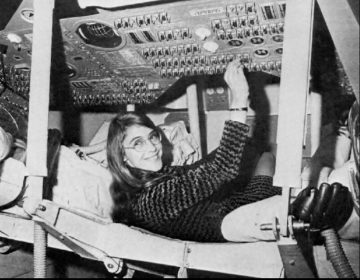It had long been tradition that operating calculating machines was “women’s work”; it was thought to be just keypunching, like typing. Women programmed and operated the punch card machines to produce calculations for the Manhattan Project. Despite the tendency of the project physicists to minimize their contribution, this was demanding work, much more than just moving cards from slot to slot — they were usually given requirements from the tech people, but often designed the approach and set up the calculations themselves.
The bias that “women do the mere programming” extended into the early days of the computer, and it meant that many of the earliest and most pioneering programmers were women, learning hands-on to do things that had never been done before. We all know about Amazing Grace Hopper, who wrote the first compiler.
Margaret Hamilton earned her BA in math from Earlham College, but obviously learned about programming on the job—there was no other way. In the photo above, she is standing in front of the printouts of the code for the Apollo guidance system, a lot of which she wrote and which she oversaw.
She was all of 31 when the Apollo 11 lunar module landed on the moon, running her code. (Apollo 11 was able to land at all only because she designed the software robustly enough to handle buffer overflows and cycle stealing.)
She’s now a tech CEO and won the ‘86 Lovelace Award and the NASA Exceptional Space Act Award.
The engineers weren’t all boys with crew-cuts, short sleeve oxford shirts, and narrow black ties. That’s just a fairy tale they told for a while.
Something to remember. I suppose today’s kids are ho-hum about these recoveries of memory, but they’re pretty neat.
For the original article: https://medium.com/@3fingeredfox/margaret-hamilton-lead-software-engineer-project-apollo-158754170da8



